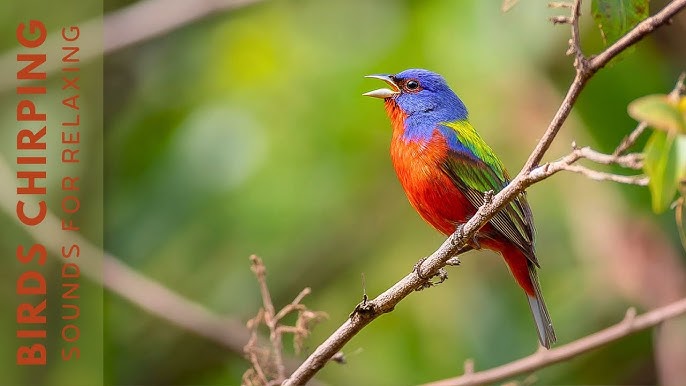Are the constant chirping sounds from birds outside your window driving you crazy? You’re not alone.
While birds bring nature’s beauty, their nonstop noise can quickly become overwhelming—especially when you need peace and quiet. But don’t worry, you don’t have to live with the noise all day. You’ll discover simple, effective ways to make birds stop chirping around your home.
Keep reading to find out how to reclaim your calm and enjoy a quieter space starting today.

Credit: ttnature.com
Reasons Birds Chirp
Birds chirpfor several key reasons. They use chirping to communicatewith other birds. This can mean sharing food locations or warning about danger.
Territorial behavioris another reason. Birds sing to mark their area and keep others away. This helps them protect their space and resources.
Mating callsplay a big role. Male birds often chirp loudly to attract females. The sounds show their strength and readiness to mate.
Environmental triggers also cause chirping. Birds respond to changes like sunrise, weather, or nearby movement. These triggers keep them alert and active.
Assessing The Chirping Problem
Knowing the bird specieshelps understand their chirping reasons. Different birds chirp for various causes like mating, warning, or territory.
Timing and frequencyof chirping matter. Birds often sing at dawn and dusk. Continuous chirping may signal distress or hunger.
Consider location factorstoo. Birds near food sources or nests chirp more. Urban areas may increase noise, causing more chirping.
Natural Deterrents
Natural deterrents like planting herbs or using essential oils can gently discourage birds from chirping nearby. These safe, eco-friendly options create an environment birds avoid without harm.
Using Visual Scare Devices
Visual scare devicescan help keep birds away. Hang shiny objects like CDs or foil strips. These reflect light and confuse birds. Owls and hawk decoys also work. Move them often to keep birds guessing. Birds think these objects are real predators. This makes them fly away.
Sound-based Repellents
Sound-based repellents
Scent And Taste Repellents

Credit: www.facebook.com
Habitat Modification
Removing food sourcescan help reduce bird chirping. Clear away bird feeders, spilled seeds, and fallen fruit from trees. This makes the area less attractive for birds searching for food.
Altering nesting sitesstops birds from settling close by. Trim tree branches, shrubs, and dense plants where birds like to build nests. Use netting or bird spikes on ledges and roof edges to block nesting spots.
Managing water availabilitycontrols bird visits. Fix leaking taps and remove standing water in trays or containers. Without easy water, birds are less likely to stay near your home.
Physical Barriers
Bird netting creates a strong barrier that keeps birds away from plants and windows. It is easy to install and very effective. Netting blocks birds without harming them.
Spikes and wire systems stop birds from landing on ledges or roofs. These devices are safe and do not hurt birds. They make surfaces uncomfortable for birds to sit on.
Covering vulnerable areas protects places where birds like to nest or rest. Use mesh covers or plastic sheets to block these spots. This prevents birds from settling and chirping nearby.

Credit: appadvice.com
Behavioral Techniques
Training and conditioninghelps birds learn when to be quiet. Use gentle voices and rewards to teach them. Consistency is key. Repeat the same actions daily to build good habits.
Consistent human presencecan calm birds. They feel safer and less likely to chirp loudly. Spend time near them without sudden moves. Quiet company helps reduce noise.
- Using distractionsshifts bird attention away from chirping. Toys, mirrors, or soft music work well.
- Offer treats during distraction time to keep them engaged.
- Change distractions regularly to avoid boredom.
Legal And Ethical Considerations
Protecting birds is very important. Many bird species are protected by law. Disturbing or harming them can lead to fines or legal trouble. Always check local rules about handling birds. These rules help keep nature safe and birds healthy.
Treat birds gently and avoid causing them stress. Use quiet and soft methods to reduce chirping. Avoid traps or harmful devices. Respect bird homes and do not destroy nests. Being kind helps maintain the balance of nature.
- Check local wildlife protection laws first
- Use only humane ways to reduce noise
- Do not harm or trap birds
- Preserve bird nests and habitats
- Respect nature and follow ethical rules
When To Seek Professional Help
Birds chirp for many reasons. Sometimes, the noise is normal. Other times, it shows a problem that needs fixing. Persistent chirping can mean birds are nesting or causing damage.
Choosing wildlife control experts helps solve these issues safely. Experts understand bird habits and can use humane methods to reduce noise. They also protect your home from harm.
| Service Option | What It Does | Benefits |
|---|---|---|
| Bird Netting | Keeps birds away from key areas | Safe and long-lasting |
| Sound Deterrents | Uses noise to scare birds | Non-harmful and easy to install |
| Physical Barriers | Blocks bird access to nests | Prevents damage and nesting |
Frequently Asked Questions
How Can I Stop Birds From Chirping Near My Window?
Try using bird deterrents like reflective tape or noise machines to keep birds away.
What Plants Repel Birds And Reduce Chirping Sounds?
Plants like lavender and marigolds can discourage birds from settling nearby.
Does Covering Outdoor Areas Help Reduce Bird Chirping?
Yes, covering spaces with netting or screens can limit bird access and noise.
Conclusion
Birds chirp for many reasons, but you can reduce the noise. Try simple solutions like sound barriers or gentle repellents. Be patient and consistent with your efforts. Avoid harming the birds or their homes. Small changes make a big difference over time.
Enjoy peaceful moments without harsh sounds. Keep your space calm and bird-friendly. This balance helps both you and nature live well together.
